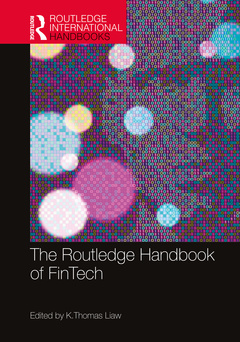The Routledge Handbook of FinTech Routledge International Handbooks Series
Coordonnateur : Liaw K. Thomas

The Routledge Handbook of FinTech offers comprehensive coverage of the opportunities, challenges and future trends of financial technology.
This handbook is a unique and in-depth reference work. It is organised in six thematic parts. The first part outlines the development, funding, and the future trends. The second focuses on blockchain technology applications and various aspects of cryptocurrencies. The next covers FinTech in banking. A significant element of FinTech, mobile payments and online lending, is included in the fourth part. The fifth continues with several chapters covering other financial services, while the last discusses ethics and regulatory issues. These six parts represent the most significant and overarching themes of FinTech innovations.
This handbook will appeal to students, established researchers seeking a single repository on the subject, as well as policy makers and market professionals seeking convenient access to a one-stop guide.
Part 1: Fintech Innovations and Trends Chapter 1: Fintech Innovations and Financial Markets: An Introduction Chapter 2: Fintech Venture Capital Chapter 3: The Future of Finance: Why Regulation Matters Chapter 4: Digital Currencies: What Role in Our Financial System? Part 2: Blockchain and Cryptocurrencies Chapter 5: Decentralized Autonomous Risk Transfer on the Blockchain Chapter 6: Distributed Ledger Technologies for FinTech: Principles and Applications Chapter 7: Initial Coin Offerings: A Statistical Analysis of the Main Characteristics Chapter 8: Initial Coin Offerings: a New Trend in the Market Chapter 9: Price Discovery in the Bitcoin Futures and Cash Markets Chapter 10: Trading and Regulation of Cryptocurrencies, Stablecoins and other Cryptoassets Chapter 11: Cryptoassets and Financial Crime: a European Union Perspective Part 3: Fintech in Banking Chapter 12: Fintechs: Unbundling to Rebundling in the Open Industry of Banking Chapter 13: Is Fintech a Threat or a Promise to Banks? Chapter 14: Virtual Rush: The Race for Virtual Banks in the Asia-Pacific Region Chapter 15: The Restructure of China's Banking Industry by Artificial Intelligence and Fintech Part 4: Fintech in Payments and Lending Chapter 16: Consumer Payment Preferences and the Impact of Technology and Regulation: Insights from the Visa Payment Panel Study Chapter 17: Meet People Where They Are: Buidling Formal Credit Using Informal Financial Traditions Chapter 18: Peer-to-Peer Lending Risk Management Part 5: Fintech in Other Financial Services Chapter 19: Rethinking Automated Investment Adviser Disclosure Chapter 20: Market Risk for Robot Advisory Chapter 21: Financial Technology in the U.S. Municipal Fixed Income Market Chapter 22: Proptech: The Real Estate Industry in Transition Part 6: Fintech Regulatory Issues Chapter 23: Machine Learning Implications for Banking Regulations Chapter 24: Regulating Fintech in Canada and the United States: Comparison, Challenges and Opportunities Chapter 25: Cryptocurrency Market Reactions to Regulatory News
K. Thomas Liaw is a Professor of Finance in the Economics and Finance Department at St. John's University, New York, USA.
Date de parution : 01-2023
17.4x24.6 cm
Date de parution : 06-2021
17.4x24.6 cm
Thèmes de The Routledge Handbook of FinTech :
Mots-clés :
Blockchain Technology; Bitcoin Prices; FinTech; DLT; FinTech Startups; financial technology; FinTech Firms; future trends of fintech; Bitcoin Markets; blockchain; Decentralized Autonomous Organizations; FinTech in banking; P2P Lending; mobile payments; FinTech Companies; online lending; Smart Contracts; financial services; Federal Reserve; ethics of Fintech; Lending Circles; regulatory issues in Fintech; Bitcoin Exchange; Bank risk management; ETF; Random Forest; FinTech innovations; Virtual Currencies; Anti Money Laundering Regulations; Regulatory Sandbox; DAI; Price Discovery; ROSCAs; Open Banking; Cloud Computing; Shadow Bank



